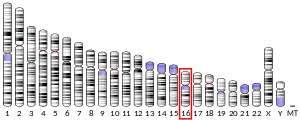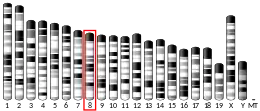SETD6
SET domain containing 6 is a protein in humans that is encoded by the SETD6 gene.[5]
| SETD6 | |||||||||||||||||||||||||||||||||||||||||||||||||||
|---|---|---|---|---|---|---|---|---|---|---|---|---|---|---|---|---|---|---|---|---|---|---|---|---|---|---|---|---|---|---|---|---|---|---|---|---|---|---|---|---|---|---|---|---|---|---|---|---|---|---|---|
| |||||||||||||||||||||||||||||||||||||||||||||||||||
| Identifiers | |||||||||||||||||||||||||||||||||||||||||||||||||||
| Aliases | SETD6, SET domain containing 6, SET domain containing 6, protein lysine methyltransferase | ||||||||||||||||||||||||||||||||||||||||||||||||||
| External IDs | OMIM: 616424 MGI: 1913333 HomoloGene: 38743 GeneCards: SETD6 | ||||||||||||||||||||||||||||||||||||||||||||||||||
| |||||||||||||||||||||||||||||||||||||||||||||||||||
| |||||||||||||||||||||||||||||||||||||||||||||||||||
| |||||||||||||||||||||||||||||||||||||||||||||||||||
| |||||||||||||||||||||||||||||||||||||||||||||||||||
| |||||||||||||||||||||||||||||||||||||||||||||||||||
| Wikidata | |||||||||||||||||||||||||||||||||||||||||||||||||||
| |||||||||||||||||||||||||||||||||||||||||||||||||||
SETD6 monomethylates the RelA subunit of nuclear factor kappa B (NF-κB). RelA mono-methylation at lysine 310 (RelAK310me1) leads to the constitutive repression of RelA target genes by recruiting the PKMT G9a-like protein (GLP), which catalyzes H3K9me2 and leads to chromatin silencing and gene repression. In response to stimulation with TNFa and lipopolysaccharide, phosphorylation of RelA at serine 311 (RelAS311ph) by PKCzeta physically blocks the interaction between GLP and RelAK310me1, leading to transcription activation.[6]
PAK4 Methylation by SETD6 Promotes the Activation of the Wnt/β-Catenin Pathway. SETD6 binds and methylates PAK4 both in vitro and in cells at chromatin. Depletion of SETD6 in various cell lines leads to a dramatic reduction in the expression of Wnt/�-catenin target genes.[7]
SETD6 binds to but does not methylate DJ1. Under basal conditions, SETD6 and DJ1 associate with chromatin which inhibits DJ1 to activate Nrf2 transcription activity. In response to oxidative stress, SETD6 mRNA and protein levels are dramatically reduced.[8]
SETD6 specifically binds and methylates PLK1 during mitosis at K209 and K413. Depletion of SETD6, as well as the double substitution of the lysine residues (K209/413R), leads to elevation in PLK1 catalytic activity, leading to the acceleration of the different mitotic steps, ending with early cytokinesis.[9]
References
- GRCh38: Ensembl release 89: ENSG00000103037 - Ensembl, May 2017
- GRCm38: Ensembl release 89: ENSMUSG00000031671 - Ensembl, May 2017
- "Human PubMed Reference:". National Center for Biotechnology Information, U.S. National Library of Medicine.
- "Mouse PubMed Reference:". National Center for Biotechnology Information, U.S. National Library of Medicine.
- "Entrez Gene: SET domain containing 6".
- Levy D, Kuo AJ, Chang Y, Schaefer U, Kitson C, Cheung P, Espejo A, Zee BM, Liu CL, Tangsombatvisit S, Tennen RI, Kuo AY, Tanjing S, Cheung R, Chua KF, Utz PJ, Shi X, Prinjha RK, Lee K, Garcia BA, Bedford MT, Tarakhovsky A, Cheng X, Gozani O (January 2011). "Lysine methylation of the NF-κB subunit RelA by SETD6 couples activity of the histone methyltransferase GLP at chromatin to tonic repression of NF-κB signaling". Nature Immunology. 12 (1): 29–36. doi:10.1038/ni.1968. PMC 3074206. PMID 21131967.
- Vershinin Z, Feldman M, Chen A, Levy D (March 2016). "PAK4 Methylation by SETD6 Promotes the Activation of the Wnt/β-Catenin Pathway". The Journal of Biological Chemistry. 291 (13): 6786–95. doi:10.1074/jbc.M115.697292. PMC 4807267. PMID 26841865.
- Chen A, Feldman M, Vershinin Z, Levy D (February 2016). "SETD6 is a negative regulator of oxidative stress response". Biochimica et Biophysica Acta (BBA) - Gene Regulatory Mechanisms. 1859 (2): 420–7. doi:10.1016/j.bbagrm.2016.01.003. PMID 26780326.
- Feldman M, Vershinin Z, Goliand I, Elia N, Levy D (January 2019). "The methyltransferase SETD6 regulates Mitotic progression through PLK1 methylation". Proceedings of the National Academy of Sciences of the United States of America. 116 (4): 1235–1240. Bibcode:2019PNAS..116.1235F. doi:10.1073/pnas.1804407116. PMC 6347700. PMID 30622182.
Further reading
- Weil LE, Shmidov Y, Kublanovsky M, Morgenstern D, Feldman M, Bitton R, Levy D (October 2018). "Oligomerization and Auto-methylation of the Human Lysine Methyltransferase SETD6". Journal of Molecular Biology. 430 (21): 4359–4368. doi:10.1016/j.jmb.2018.08.028. PMID 30189201. S2CID 52167348.
- Kublanovsky M, Aharoni A, Levy D (July 2018). "Enhanced PKMT-substrate recognition through non active-site interactions". Biochemical and Biophysical Research Communications. 501 (4): 1029–1033. doi:10.1016/j.bbrc.2018.05.103. PMID 29778536. S2CID 205956659.
- Feldman M, Levy D (January 2018). "Peptide inhibition of the SETD6 methyltransferase catalytic activity". Oncotarget. 9 (4): 4875–4885. doi:10.18632/oncotarget.23591. PMC 5797019. PMID 29435148.
- Martín-Morales L, Feldman M, Vershinin Z, Garre P, Caldés T, Levy D (November 2017). "SETD6 dominant negative mutation in familial colorectal cancer type X". Human Molecular Genetics. 26 (22): 4481–4493. doi:10.1093/hmg/ddx336. PMID 28973356.
- Chang Y, Levy D, Horton JR, Peng J, Zhang X, Gozani O, Cheng X (August 2011). "Structural basis of SETD6-mediated regulation of the NF-kB network via methyl-lysine signaling". Nucleic Acids Research. 39 (15): 6380–9. doi:10.1093/nar/gkr256. PMC 3159447. PMID 21515635.
- Levy D, Liu CL, Yang Z, Newman AM, Alizadeh AA, Utz PJ, Gozani O (October 2011). "A proteomic approach for the identification of novel lysine methyltransferase substrates". Epigenetics & Chromatin. 4: 19. doi:10.1186/1756-8935-4-19. PMC 3212905. PMID 22024134.



